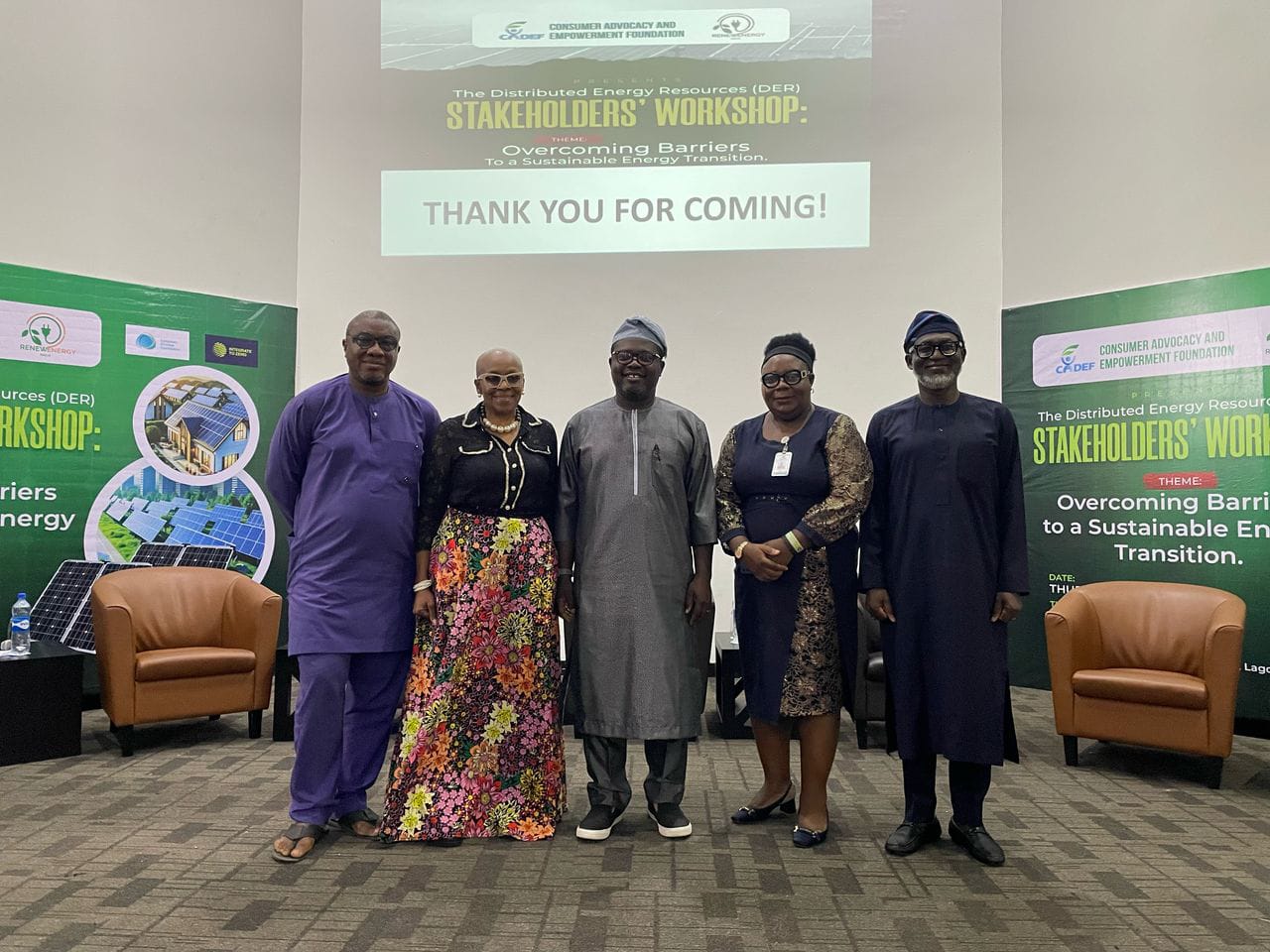This is contained in a statement signed by Dr Ejike Ndiulo, head of Corporate Communications, Air Peace, on Wednesday in Lagos.
According to Ndiulo, the decision is necessary because NiMet is the agency responsible for issuing CNH (Current Nowcast of Hazardous Weather) reports, critical for safe landings, especially during this season of heavy rainfall and thunderstorms.
He said without these reports from the control tower, flight safety could not be guaranteed.
“As a safety-first airline, we have chosen to act responsibly by suspending operations until NiMet resumes full service.
“We understand this may cause inconvenience, and we sincerely apologise. Passengers will be contacted with updates and options for rescheduling,” he said.
The staff of NiMET on Tuesday commenced an indefinite strike over the condition of service and other demands.
News
Nigerians Reject GMO Crops amidst Safety Concerns

A coalition of over 100 civil society actors, farmers, scientists, legal practitioners, and academics representing some 100 million Nigerian consumers have placed a demand on the federal government to discontinue plans to introduce genetically modified potatoes and out-rightly ban GMOs in the country as, according to them, they (the GMOs) violate fundamental human rights and targets Nigeria’s food system for disaster.

GMOs are food items that have been made using genetic engineering techniques.
The coalition demand was made in a press statement shared with the media, following the announcement that the Federal Government will soon release a report on clinical trials on genetically modified (GM) potatoes.
Similar reports indicate that GM Potatoes will be commercially released in 2025.
Nnimmo Bassey, executive director, Health of Mother Earth Foundation (HOMEF), noted that any further release of GMOs in Nigeria would be confirmed as a deliberate effort to destroy the Nigerian food system, jeopardise consumers’ health and degrade our environment.
“The House of Representatives in May 2024 announced a halt on introducing new GMOs and mandated an investigation on GMOs and the approval processes. To date, four months later, there is no information on the findings or results of this investigation, yet the National Biosafety Management Agency (NBMA) is warming up to release new GM potatoes. There are indeed vested interests on the side of the transnational corporations producing the GMOs and their allies in government undermining the health and safety of the Nigerian populace,” he added.
On the GM Potatoes, Bassey stated that it is a narrow and short-sighted technological fix that is inappropriate for smallholder farmers in Nigeria and that could lead to an irreversible contamination of indigenous potato varieties. GM potatoes are banned in Peru and elsewhere and have been continuously spurned in developed countries. It is a wonder that Nigerian farmers are already been painted to clamour for the Potatoes. This was the same strategy used in Uganda and Rwanda.
Dr Ifeanyi Casmir, a Molecular Biologist, noted that, just like Bt Cotton, Bt Beans, and TELA Maize, the GM Potatoes represents a gradual yet sure erosion of the original germ plasm of Nigerian crops.
He said: “We are being misled by half-baked parochial ‘scientists’ toward adopting a technology, whose products are mostly used as biofuels and feed for animals in other countries – not for human consumption. What our government needs to do is to address the instability in Plateau State and other potato producing states where banditry has caused farmers to abandon their farms – leading to poor productivity and rising cost of potatoes across the country. Potatoes growers in Plateau State and other places who will accept this genetically modified variety are being set up for devastation.”
Mariann Bassey-Orovwuje, Food Sovereignty Activist and Deputy Director of Environmental Rights Action, emphasised the regulatory lapses regarding GMOs.
She stated: “Up till now, there is no information on the application for the field/clinical trials on the GM Potatoes on the website of the NBMA whose mandate it is to regulate the use of GMOs and ensure adequate public participation in the decision-making process. The secrecy and urgency with which GMO applications and approvals are handled is cause of serious concern.
“These GM potatoes are banned at the potato centre of origin in the Andes, with indigenous farmers warning that GM potatoes are a terrible idea. Additionally, Late blight is not a uniquely African problem, which raises the question as to why it is being forced on Africa, on Nigeria. The simple answer is commercial interests.”
According to Joyce Brown, Public Health Scientist and Director of Programmes at HOMEF, “There is no information as to whether there have been long-term feeding studies conducted on these GM Potatoes varieties. It is not sufficient to carry out field trials or short-lived clinical trials. This GM potato is the same which is being pushed on East Africa; a “cisgenic” variant of the Victoria variety that was originally from South America but selected for use in Africa. The GM Victoria was developed by the International Potato Centre (CIP) and is genetically engineered with three genes that were taken from Latin American relatives of the potato plant. Cisgenesis modification is still a new and unproven technique, and it is not yet clear how the stack of three genes will interact with each other or with the genetic material of the host plant.”
Lovelyn Ejim, a farmer and founder of Network of Women in Agriculture, noted that Nigeria does not need genetic modification to address the late blight disease.
“The disease is not new and simple organic methods have over time proven to be affective including choosing naturally resistant varieties, crop rotation, mixed cropping, providing proper crop nutrition, crop spacing, quick removal of blighted plants etc.
Nigerian farmers have not asked the government for GMOs. Late blight is a robust and fast-adapting pathogen and therefore will undoubtedly develop resistance to this technology.
“We are very concerned about the lack of participatory stakeholder engagement with farmers and consumers and the limited information available on the long-term consequences of GMOs, as well as the proprietary issues concerning the GM seeds,” she concluded.
News
Lagos Sets the Benchmark in Renewable Energy as CADEF Launches Transformative Platform

Against the backdrop of Lagos State’s proactive efforts to reform its electricity sector, the Consumer Advocacy and Empowerment Foundation (CADEF) has launched its ‘Renew Energy Nigeria’ platform, a nationwide initiative with potential synergies for the state’s ambitious energy goals.

Professor Chiso Ndukwe-Okafor, CADEF’s Executive Director, introduced the platform in Lagos, highlighting its aim to empower Nigerians with information and access to decentralized renewable energy (DER) solutions. “The launch of this platform marks a significant step towards democratizing access to information and resources within Nigeria’s burgeoning sustainable energy sector.”
The platform’s launch comes as Lagos State, under the Lagos State Electricity Law, is actively establishing a regulatory framework and attracting private sector investment. Kamaldeen Abiodun-Balogun, General Manager of the LSEB, detailed the state’s progress in creating a functional electricity market, ensuring payment security, and addressing infrastructure challenges. “This law enabled us to create policy documents and establish regulatory agencies to initiate the implementation of the Lagos electricity market,” he explained, adding that private sector involvement will be key in areas where existing Discos face performance issues.
Segun Adaju, a private sector player deeply engaged in the energy sector, lauded Lagos State’s leadership. “In all these, Lagos State is always setting the pace. Many of us in the private sector players like myself, we are also looking up to Lagos State to set the pace,” he said, also mentioning his work on the Centralized Renewable Energy Desk for the state government.
While acknowledging national-level challenges such as import restrictions and forex fluctuations as noted by Professor Ndukwe-Okafor: “The recent federal plan on restrictions on the importation of solar products and the fluctuation of forex rate have made clean energy solutions costly”, the focus on Lagos State’s progress suggests a promising local environment for DER adoption, potentially amplified by CADEF’s new platform.
The broader socio-economic context, as highlighted by Olumide Ajayi, “Over 40% of Nigerians do not have access to reliable electricity”, underscored the importance of initiatives like ‘Renew Energy Nigeria’ and the enabling policies being implemented in states like Lagos.
Professor Ndukwe-Okafor concluded with a powerful call to action. “This platform is not an isolated intervention. It is aligned with our ideal country’s national vision, the 30-30-30 initiative. Let us not build a solar future that only serves the wealthy. Let us democratize clean energy. Let us make it local, inclusive, and scalable.”
The launch of “Renew Energy Nigeria” marks a significant step towards a more sustainable and equitable energy future for Nigeria, driven by innovation, collaboration, and a commitment to empowering its citizens. The platform is now live and accessible to all Nigerians seeking reliable and clean energy alternatives
News
EFCC Secures Arrest Warrant for Six CBEX Promoters

A federal high court in Abuja has granted permission to the Economic and Financial Crimes Commission (EFCC) to arrest and detain six Crypto Bridge Exchange (CBEX) promoters over allegations of investment fraud to the tune of over one billion dollars.

Emeka Nwite, presiding judge, gave the order following an ex parte application moved by Fadila Yusuf, counsel to the EFCC.
In the application by the EFCC, the six suspects are Adefowora Olanipekun, Adefowora Oluwanisola, Emmanuel Uko, Seyi Oloyede, Avwerosuo Otorudo and Chukwuebuka Ehirim.
The commission sought an order of the court for a warrant of arrest of the defendants.
They also prayed the court for “an order remanding the defendants in the custody of the complainant/applicant pending the conclusion of investigation of the alleged offences and possible prosecution”.
Yusuf said that the defendants are at large and a warrant of arrest is required to arrest the defendants for proper investigation and prosecution of this case.
In the affidavit in support of the motion, the EFCC said preliminary investigation into the intel revealed that the defendants “using their company ST Technologies International Limited, promoted another company Crypto Bridge Exchange (CBEX) by making adverts and lured unsuspecting members of the public to invest crypto cryptocurrencies on the CBEX investment platform”.
The EFCC said the defendants promised an unrealistic return on investment of up to 100 percent.
“The victims were made to convert their digital assets into a stablecoin of USDT for onward deposit into the suspects’ crypto wallet,” Yusuf said.
“The victims were initially given full access to the platform to monitor their investment.
“Following the deposits valued at over $1 billion by the victims, the CBEX investment platform became inaccessible to them, and they could no longer withdraw from the investment made.
“The victims later discovered that the said scheme is a scam.
“During the course of investigation, it was discovered that the said ST Technologies International Limited, though registered with the Corporate Affairs Commission (CAC), it was not registered with the Securities and Exchange Commission (SEC) for investment purposes.
“It was also discovered during the investigation that the defendants had moved out of their last known address in Lagos and Ogun states.”
The anti-graft agency said obtaining a warrant of arrest was necessary in order to place the defendants on a watch list, enabling authorities to trace and apprehend the suspects to face the charges brought against them.
Nwite granted the request for a warrant of arrest and remand, adding that the order was necessary to enable the commission to apprehend the defendants and conclude its investigation.
“I have listened to the submission of the learned counsel for the applicant,” Nwite said.
“I have also gone through the affidavit evidence with exhibits thereto, along with the written address.
“I am of the view and I so hold that the application is meritorious.
“Consequently, the application is granted as prayed.”
Earlier in April, reports emerged that CBEX users could no longer withdraw their funds.
On Monday, angry investors stormed and looted the office of Smart Treasure (ST Team), an affiliate of CBEX, in Ibadan, Oyo State.
The EFCC recently confirmed receiving multiple complaints about the platform.
Dele Oyewale, the commission spokesperson, assured affected investors that efforts were underway to recover their funds.
News
Air Peace Suspends Flight Operations Nationwide


 Telecom2 days ago
Telecom2 days agoMTN Appoints Egerton Idehen as Chief Broadband Officer

 General News2 days ago
General News2 days agoUBA Marks 75 Years of Excellence at 65th AGM

 E-Business3 days ago
E-Business3 days agoALX Nigeria Launches 2025 Ventures Incubator, Premieres Pan-African “Do Hard Things” Finale

 Telecom2 days ago
Telecom2 days agoMTN Group Suffers Cyberattack

 Telecom2 days ago
Telecom2 days agoMTN Foundation Launches Skills Academy to Bridge Nigeria’s Digital Skills Gap

 Telecom2 days ago
Telecom2 days agoDigital Realty Expands ServiceFabric to Nigeria, Enhancing Global Interconnectivity

 Telecom2 days ago
Telecom2 days agoLegend Internet Plc Makes History as First Indigenous Telecom Firm on NGX
- Telecom2 days ago
Tribunal Upholds FCCPC’s $220m Fine against Meta, WhatsApp

















